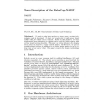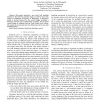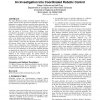32 search results - page 3 / 7 » Game Theoretic Control for Robot Teams |
IROS
2007
IEEE
14 years 5 months ago
2007
IEEE
— Multi-agent systems (MAS) are a field of study of growing interest in a variety of domains such as robotics or distributed controls. The article focuses on decentralized reinf...
ATAL
2004
Springer
14 years 4 months ago
2004
Springer
Partially observable decentralized decision making in robot teams is fundamentally different from decision making in fully observable problems. Team members cannot simply apply si...
ROBOCUP
1999
Springer
14 years 3 months ago
1999
Springer
Abstract. To make a robot team perform a soccer game, various technologies must be developed. To date, we constructed a multi-sensor based mobile robot for robotic soccer research....
ICARCV
2008
IEEE
14 years 5 months ago
2008
IEEE
—This paper describes a new active ball handling method for the RoboCup mid-size league as used by team Tech United at Eindhoven University of Technology. A theoretical model is ...
ACMSE
2006
ACM
14 years 25 days ago
2006
ACM
The Lego Mindstorms Robot Command eXplorer (RCX) is a popular robotics kit that provides an immediate "out-of-the-box" opportunity to explore software controlled robot i...



